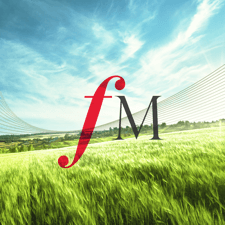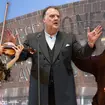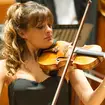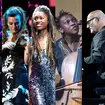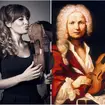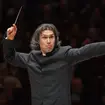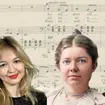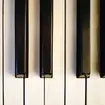Nicola Benedetti: ‘I will be reaching out to Keir Starmer about the future of music education’
20 August 2024, 17:06

Nicola Benedetti: What the Government can do for music education | Classic FM
Star violinist Nicola Benedetti believes every child should receive a great music education – but it’s “not as simple as” a financial fix.
Listen to this article
Nicola Benedetti is a leading violin soloist of our times, now in the second year of her other full-time job: directing the Edinburgh International Festival, an extension of her commitment to bringing quality music to the masses.
As this year’s festival got underway, Benedetti spoke to Classic FM’s Ritula Shah about her own musical upbringing, love for the violin, and her hopes for the future of music education under a new government.
‘I was told I could play the violin, but it wasn’t a toy’
From a very early age, Benedetti learned the importance of a disciplined commitment to playing music.
Her mother, who Benedetti describes as “a great mix of deeply loving and pretty strict”, made it clear that playing a musical instrument was a privilege, one that she didn’t have.
“My mum was desperate to learn to play the piano and wouldn’t even dare ask her mum because she knew that they couldn’t afford it,” Benedetti told Shah. “She just wouldn’t have asked the question.”
Benedetti was told she could play the violin, but that it “wasn’t a toy”. If lessons were to be paid for, she would need to practise every day, even just for five minutes.
“I learned the daily routine discipline quite early, in a way that was palatable for that age,” the violinist adds.
“I remember Lang Lang saying once that there was such an intense pressure on him to play the piano, and it worked out well for him because he loved the piano. But if the same intensity had been applied in the same way and he didn’t have that love for an instrument, it can be a pretty difficult, if not traumatic, experience.”
Read more: Nicola Benedetti has ‘strong feelings’ on mobile phones at classical concerts

‘Practise every day – even if it’s for five minutes’
Now a mother herself, Benedetti’s two pieces of advice to parents of young children learning an instrument is to encourage them to play every day, but throughout the practice, try to preserve as much as possible that pure love for music.
“When you’re trying to address that dilemma of where discipline, desire and love for a thing meet, the more you have that love for something, the more you can apply the discipline to it,” she says.
“And if a young person enjoys playing a bit of violin or flute, or piano or guitar, but they’re not intense about it, it’s still a good thing to do it every day. You don’t have to do it for hours, but just do it every day, try to build in good habits. And most importantly, protect your positive relationship to music more than the instrument.”
Listening to music, and joining an ensemble, are two good places to start – “things that bring a social vibration to the experience of music”, Benedetti adds.
But playing the violin is an activity she never questioned. “I liked it from lesson three,” Benedetti says. “I never once considered not playing the violin. My mum, one day I was fighting her to practise, and she said, Well, you don’t have to play the violin. And I was like, ‘Well, what do you mean?’
“And she said, ‘Well, if you play the violin, you have to practise. There’s no compromise there’. And I was so, so heartbroken that she would consider that I would not want to play the violin. I think I probably never questioned whether I was going to practise ever again.”

Benedetti has fond memories of her early years of practice, which sometimes involved tears – but not the kind you might expect.
“When I was about six or seven, I learned ‘Salut d’amour’ by Elgar, a piece I’ve since recorded, and was moved to tears. My mum says that I was actually crying, learning the piece, which is a little bit over the top! But obviously I was really young, so it was very instinctive.
“I was always drawn by the emotion of music more necessarily than the virtuosity,” Benedetti tells Shah.
‘We need a better structure for music education’
For over a decade, music has been disappearing from schools. In many state schools across the country, music is no longer offered as part of the curriculum at GCSE and A-Level grade.
With a new Labour government in power, Benedetti says there is “a lot of opportunity now” to make a difference for the next generation of young music lovers.
“Many individuals in key positions have a from-childhood, natural affinity to, and respect for, relationship to music, music, education, learning to play instruments, classical music – as a part of life’s education,” she says.

Elgar: Salut d'amour, Op. 12
In 2019 she established the Benedetti Foundation, a music education charity that creates mass music-making events for everyone. Since its inception, the foundation has worked with 75,000 people aged two to 92.
“The natural thing to say is we need more money, more funds,” Benedetti tells Shah. “What I would say we don’t need is more advice and reports.
“I know hundreds, if not thousands, of teachers and musicians and music education advocates all around the country that know exactly what they would do and what to do, provided they had the infrastructure, the resource and the support.
“Of course, things need to be to be funded and paid for, but the structure and infrastructure needs to be there to allow them to do their job. That can be anything from time within a week, within a school, to have some moment for music that is protected and prioritised. It can be something like access to instruments, teacher training and support, head teacher advocacy for music to be a part of what classes as a first-rate education for everyone.
“I don’t want to give a cliche answer of, you know, ‘Well, if X million were given to this, then that would solve the problem. I’ve spent too many years within this realm to know that it’s not as simple as that. It takes the whole nation to look at music as a necessary part of a great education,” she adds.
Is Benedetti hoping or expecting to talk to the Culture Minister, Lisa Nandy or indeed, the prime minister who himself is a trained musician anytime soon, to help shape the future of music education?
“Yes. I’ll be reaching out to everyone.”
